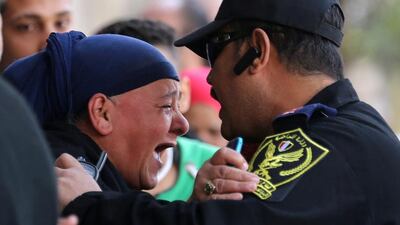CAIRO // Twenty-five people were killed and 35 wounded in a bombing at Egypt’s main Coptic Christian cathedral on Sunday, one of the deadliest attacks carried out against the religious minority in recent memory.
The blast, which killed mostly women and children, was condemned by political and religious leaders and led President Abdel Fattah El Sisi to declare three days of national mourning.
Sheikh Abdullah bin Zayed, Minister of Foreign Affairs and International Cooperation, said the UAE vehemently condemned the attack. “These cowardly terrorist acts will never undermine the resolve of the Egyptian people,” he said.
The bomb tore through the morning service at the Saint Peter and Saint Paul Church, which is next to Saint Mark’s Cathedral, the seat of the Coptic pope Tawadros II. The bomb consisted of 12 kilos of TNT, security officials said.
The explosion shattered the church’s windows and scattered pews through the main prayer hall, scorching its marble pillars. Blood stains could be seen on the floor, where shoes and other belongings lay scattered.
“I found bodies, many of them women, lying on the pews. It was a horrible scene,” said cathedral worker Attiya Mahrous.
“I saw a headless woman being carried away,” Mariam Shenouda said as she pounded her chest in grief. “Everyone was in a state of shock. There were children. What have they done to deserve this? I wish I had died with them instead of seeing these scenes.”
Jackline Abdel Shahid said she was leaving the church when she heard the explosion.
“There was a lot of smoke and people started running and screaming,” she said. “The ambulances started coming, and they kept bringing out body parts. The whole church was stained with blood, broken glass everywhere, everyone screaming, torn clothes.”
Gebrail Ebeid, who was on his way to the service when the bombing took place, accused Egypt’s government of not doing enough to protect the Christian community.
“Where were the security forces? They’re filling the streets now, but it’s too late,” he said.
The attack came two days after a bomb in Cairo killed six policemen, an assault claimed by a group that authorities said was linked to the outlawed Muslim Brotherhood.
Several dozen people gathered outside thw church to protest after the bombing, chanting for the resignation of Egypt’s interior minister.
It was the worst attack on the Coptic Christian community since a 2011 suicide bombing killed more than 20 worshippers outside a church in Alexandria.
Interior minister Magdy Abdel Ghaffar rushed to the area after the blast and prime minister Sherif Ismail called on security services to quickly find those responsible.
“The nation’s Muslim and Christian citizens stand together against this black terrorism,” Mr Ismail said.
Mr El Sisi condemned what he described as “the abhorrent terrorist attack”. “Egypt will only emerge stronger and more unified from these events,” he said.
The president also called the pope to offer his condolences.
Sheikh Ahmed Al Tayeb, the head of Al Azhar, the seat of Sunni Islam learning, said the “vile terrorist explosion” was “a great crime against all Egyptians”.
The church that was targeted “is deeply loved by many Coptic faithful in Cairo and it has a regular parish presence,” said Bishop Angaelos, the General Bishop for the Coptic Church in Britain.
He said services had been held in the church on Sunday morning, while Saint Mark’s Cathedral was being renovated.
“It’s an easier target because its entrance is outside the precincts” of the cathedral.
Copts have faced persecution and discrimination dating back to the 30-year rule of Hosni Mubarak, who was toppled by a popular uprising in 2011.
Dozens have been killed in recent years in sectarian attacks and clashes throughout Egypt.
In April 2013, two people died in clashes with local residents outside Saint Mark’s Cathedral, the spiritual heart of the largest Christian minority in the Middle East.
Extremists in August 2013 attacked churches and homes of Copts in retaliation for the dispersal by security forces of Cairo protest camps of supporters of president Mohamed Morsi of the Muslim Brotherhood, who was deposed after vast protests against his short and divisive rule.
Enraged by the crackdown in which hundreds died, mobs lashed out at Copts in the Upper Egypt province of Minya, accusing them of backing the military.
More than 40 churches were attacked nationwide, with most attacks in Minya and Assiut.
Security forces have been the main target of attacks following Morsi’s downfall.
Most of the attacks have taken place in the Sinai Peninsula by a branch of ISIL, although militants have also targeted security forces and government officials in Cairo.
* Agence France-Presse and Associated Press

